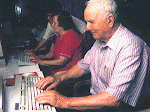Itaska, IL - Experts in the care of newborn infants from the American Academy of Pediatrics (AAP) have released updated guidelines on the diagnosis and management of low blood sugar in newborn nurseries and neonatal intensive care units.
 |
| A group of non-threatening teenagers, shown here just prior to a meal and possibly suffering from undiagnosed hypoglycemia |
"Preprandial glucose monitoring should be in place for all infants regardless of gestational age at birth, birthweight, or maternal conditions," Munish Gupta, MD, current chair of the AAP Section on Neonatal-Perinatal Medicine, explained. "And because glucose is such a vital metabolic fuel necessary for brain function and health, we are now recommending that point-of-care testing prior to each meal continue until at least the age of 18 years when a patient can make an informed decision on whether or not to continue the hypoglycemia protocol. I would keep doing it though, just to be safe."
A severe drop in blood glucose can result in irreversible injury to the brain and even death if not corrected in time. According to Gupta, it is vital that treatment protocols are in place that quickly treat hypoglycemia before injury to the brain occurs. "In the nursery, we apply a glucose gel to the infant's cheek that is quickly absorbed through oral mucosa. For older children, I guess you could give them solid food? Like a cookie? I'm sorry, I just do babies."

No comments:
Post a Comment